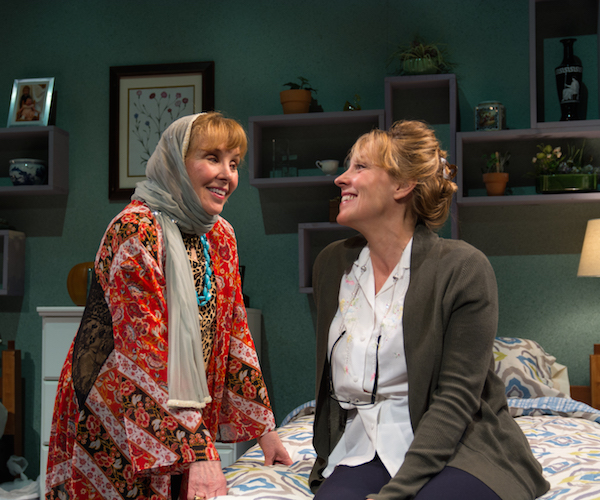Theater Review: Peterborough Players’s “Ripcord” — Arguing for a Full Life
David Lindsay-Abaire’s tightly woven comic script celebrates dramatically and honestly the everyday relationships that make up an argument for a full life.
Ripcord by David Lindsay-Abaire. Directed by Gus Kaikkonen. Staged by Peterborough Players at 55 Hadley Road, Peterborough, NH through February 24.

(L to R) – Kathy Manfre and Lisa Bostnar in the Peterborough Players production of “Ripcord.” Photo: Will Howell.
By Jim Kates
Ripcord gets right everything that Peterborough Players’s Every Brilliant Thing got wrong. David Lindsay-Abaire’s tightly woven comic script celebrates dramatically and honestly the everyday relationships that make up an argument for a full life.
The premise of Ripcord is the standard theatrical situation of an odd couple whose anatagonistic differences draw out their strengths, their compassions, and eventually their compatability. Specifically in Ripcord, two women of a certain age (and we’ll get to this age a little later) are roommates in the Bristol Place Senior Living Facility. Abby Binder (Lisa Bostnar) has been established there some time, accustomed to having her own antisocial way. She has quite literally as well as symbolically lost any taste for the good things of life. Marilyn Dunne (Kathy Manfre) a sunny-dispositioned newcomer, has been newly assigned the other bed in the room.
Unable to put up with Dunne’s always looking on the bright side, Binder agrees to a bet. The winner will get to dictate their living conditions — meaning either that Dunne will leave, or Binder will cede to her the bed with the better view.
Can Binder spark Dunne into anger before Dunne can get Binder to feel fear — and by extension, to feel anything? Of course, we know that the effort of each will open up the other, and they will end up ratifying their living together. In working this out, Lindsay-Abaire’s writing is slightly unbalanced toward Binder, whose reclamation moves clearly from the beginning to the dénouement. But the most revelatory and chilling moment of the play comes at the end of the first scene in the second act, when Binder confronts Dunne quietly and devastatingly with a single line, perfectly poised in this production: “I wasn’t talking about [the bet].” For that vital instant, the script’s comic trappings are stripped away, the game’s moral stakes are revealed, and Dunne’s underlying pain is laid bare.
With the familiarity of an established repertory theater, the Peterborough company comes together in midwinter in fog and thaw like a breath of their summer season. Director Gus Kaikkonen arrives fresh from a successful run of Hindle Wakes by Stanley Houghton at the Mint Theater in New York. Will Howell and Bridget Beirne, fresher recruits to the Peterborough scene (and Tyler Richardson, a real newcomer) help fill out the cast of family members and facility staff who help move the plot forward. But the action really depends on Bostnar and Manfre, who have so often worked together comfortably before. Here, they have their sweet-and-sour matching well in hand, like a chamber-music duo — or rather like the established theatrical couple they are. They and Kaikkonen resist any temptation to let the situation govern the characterization. Manfre makes Dunne’s relentless positive outlook more businesslike than bubbly, and Bostnar effectively understates the pain and acerbity of her own dyspeptic character.
At the start of Ripcord, both Manfre and Bostnar both appear physically too young (the script itself seems a little ambiguous here — we are never clear on exactly how old they are) for their settlement in this kind of Senior Facility, but the quality of the two performances ages them appropriately as the evening goes on. Less appropriate is the furnishing of the room itself. Charles Morgan’s set provides too many knickknacks of a nonpersonal kind to be convincing for this kind of apartment.
Whether the Peterborough Players can continue a winter season is another question. This is the second year of ths experiment, while the summer program is more than eighty years old. The venerable company depends on attendance as well as the donations of supporters. Weather and new economic politics affect each of these. This adds to the tension between the chance to use the off-season to present offbeat, experimental theatrical events or attractive crowd-pleasers.
Ripcord is a crowd pleaser. It deserves more crowds.
Jim Kates is a poet, feature journalist and reviewer, literary translator and the president and co-director of Zephyr Press, a non-profit press that focuses on contemporary works in translation from Russia, Eastern Europe, and Asia. His latest book is Muddy River (Carcanet), a translation of verse by Russian existentialist Sergey Stratanovsky. His translation of Mikhail Yeryomin: Selected Poems 1957-2009 (White Pine Press) won the second Cliff Becker Prize in Translation.

